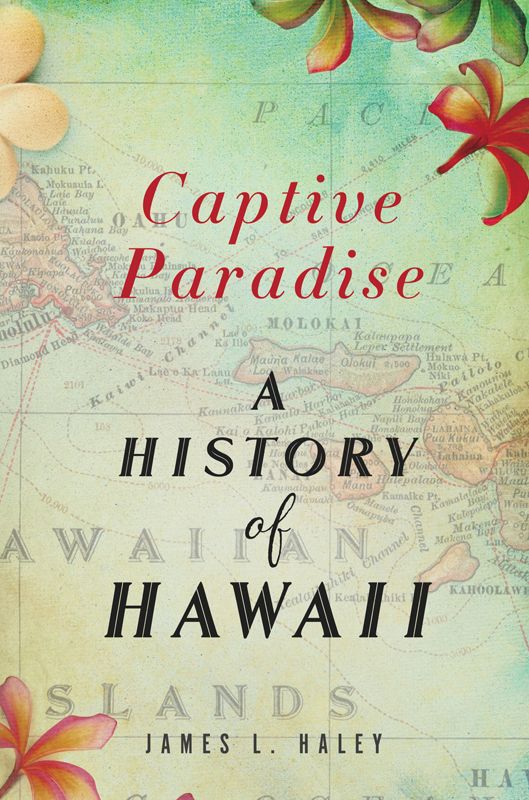
Captive Paradise
A History of Hawaii
کتاب های مرتبط
- اطلاعات
- نقد و بررسی
- دیدگاه کاربران
نقد و بررسی

November 17, 2014
This expansive work from historian and novelist Haley (Wolf: The Lives of Jack London) focuses on Hawaii's annexation by the United States. Weaving a vast web of culture clashes amid the military and ideological conquests that turned native Hawaiians into "strangers in their own land," Haley delivers his narrative through big personalities: royalty, missionaries, and conquerors of various backgrounds. His excellent exploration of the legendary figures of Hawaiian culture avoids the revisionist tendency to "rhapsodize over the natives' lost innocence" and "gloss over the horrors of precontact life." Haley examines the popularlyâand rightfullyâmaligned forces of "American avarice" alongside the lesser known influences of "French thuggery and British vacillation" that helped breed "native acolytes" of Western thought. This balanced perspective is certainly welcome in the canon of Hawaiian history, which is often beset by political agendas. Although the 20th century receives an all-too-brief summary that begs for a follow-up volume, this is an otherwise eye-opening study of Hawaii before it became a modern tourism capitalâthe Hawaii which continues to fascinate Westerners today.

October 1, 2014
Revisionist, evenhanded look at Hawaiian dynastic tenacity against ceaseless challenges by larger imperialist powers. The United States' annexation of Hawaii in 1898 was not quite a clear-cut, naked act of economic and military rapacity; it required decades of collusion in the Americanization of this highly strategic Pacific archipelago. Novelist and historian Haley (The Texas Supreme Court: A Narrative History, 1836-1986, 2013, etc.) presents a nuanced history that first takes into account the complex and oppressive relationship between the chiefs and the kanaka, the people of the land, in an enormously stratified society that was controlled by a system of kapu ("set apart, holy, forbidden"). Arriving in 1778, Capt. James Cook, declaring the islands the Sandwich Islands, recognized the culture as Polynesian, and while their iron and white skins rendered the English sailors godlike in the eyes of the natives, familiarity bred contempt (the native women avidly mated with these otherworldy men yet the venereal diseases' spread might have originated from previous contact with Japanese sailors and others), and in a melee, Cook was overwhelmed and stabbed to death. With the help of American weapons, King Kamehameha became undisputed chief of the islands, creating central authority and wealth. However, the allure of the islands attracted Russian, British, French and American vessels as a Pacific crossroads in which exotic fruits like pineapple from the Philippines were introduced, as well as the inevitable "resource extraction" begun in the form of the harvesting of sandalwood trees by American entrepreneurs. The efforts by Christian missionaries and American advisers, the destruction of the kapu system by Queen Ka'ahumanu and the addiction to luxury items (sugar) by the chiefly class all helped undermine the native culture. Haley underscores how remarkable it was that the islands were able to withstand coercion by French, British and American forces for as long as they did. A pertinent work of keen understanding of the complex Hawaiian story.
COPYRIGHT(2014) Kirkus Reviews, ALL RIGHTS RESERVED.

October 15, 2014
It has been nearly 50 years since the publication of Gavan Daw's Shoal of Time, a definitive text on Hawaiian history. Historian Haley (Wolf: The Lives of Jack London) relies on that seminal work, along with several primary sources, to narrate a haunting tale of imperialism beginning with the islands' discovery by British explorer James Cook in 1778. Multiple forces--British, Russian, French, and Japanese--sought the isolated archipelago because of its strategic location and natural resources of sandalwood and sugar. Natives initially viewed Cook as a deity, mesmerized by his impressive armada and weaponry. Yet they quickly became disillusioned by British-inflicted massacres and avenged Cook at their own hands. Tensions also flared when missionaries, opposed to polygamy and endogamy, sought to Christianize the islands after the death of revered King Kamehameka. Haley describes a dwindling population owing to previously unknown disease; the remaining population adjusting to a capitalist economy; and a hurried U.S. annexation in 1898, complete with the imprisonment of Queen Lili'uokalani, to prevent the archipelago from becoming a Japanese port. VERDICT Brimming with phrases in the Hawaiian language, this meticulously researched account contains everything from local folklore to biographies of pre-statehood rulers. While occasionally too dense for casual readers, Haley's latest work is essential for readers interested in American history or politics.--Stephanie Sendaula, Library Journal
Copyright 2014 Library Journal, LLC Used with permission.

October 1, 2014
For many non-Hawaiians, the comforting images persist. They include an island paradise with beautiful white sand beaches, great surfing, and happy Polynesians who place leis on the necks of tourists. But as this excellent survey of Hawaii's history, from discovery by Europeans to American annexation in 1898, reveals, the islands endured endemic civil wars, unity enforced by brutal political repression, and the benefits and curses of imperialism. Once Captain Cook visited Hawaii in the late eighteenth century, it became a target of British, American, and other European imperialists, lured by agricultural richness and the potential of the islands as a way station on the way to China. The chronic disunity of the islands was ended in the nineteenth century by the military prowess and ruthlessness of King Kamehameha I. Perhaps inadvertently, the king opened his unified kingdom to massive cultural, political, and economic penetration by American traders, missionaries, and industrialists. Haley regards the rather sleazy annexation as indefensible, but he recognizes that Hawaiians were often willing participants in their political and cultural absorption by the U.S. This is a revealing and balanced view of Hawaii's history in the nineteenth century.(Reprinted with permission of Booklist, copyright 2014, American Library Association.)

























دیدگاه کاربران